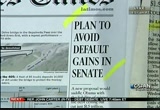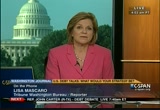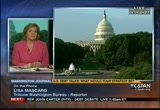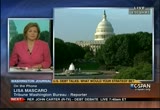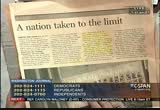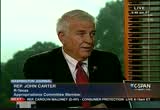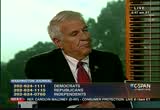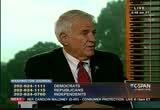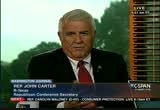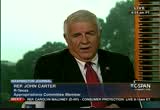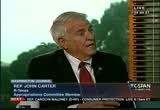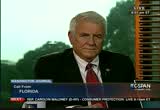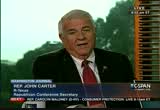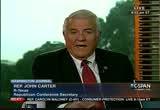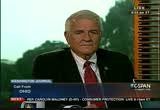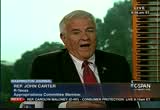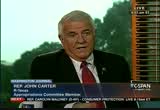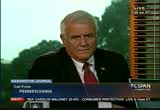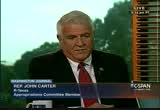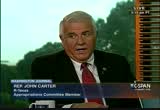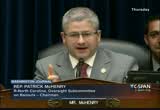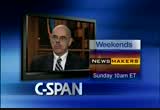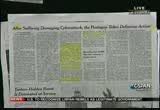tv Washington Journal CSPAN July 15, 2011 7:00am-10:00am EDT
7:00 am
representative carolyn maloney on the debt and deficit and the consumer financial protection bureau, which begins operating next week. and at 9:15, chris strohm, national security reporter for the national journal, will look at the pentagon's new cybersecurity plan. "washington journal," taking your phone calls, emails, and tweets, live every morning starting at 7:00 eastern on c-span. host: good morning. it's friday, july 15, 2011. you're looking at a live picture of the u.s. capitol. it's a beautiful day here in washington, d.c., but tempers still seem high in the discussions over raising the debt limit. republican house conference has an 8:00 a.m. meeting. the president has called a press conference for 11:00 a.m. eastern time. it does not look like any breakthroughs have yet emerged in these discussions.
7:01 am
so our question for you on this friday morning is, if you had a seat at the table, what would your strategy be? 202-624-111 for democrats in the audience. for republicans, our phone number is 202-624-1115. for you i understand penalties, here's your phone line, 202-624-0760. you can also send us a message by twitter or email us. the u.s. debt limit talks, what would your strategy be? and we're going to begin on this friday morning by talking with a reporter covering this for the tribune papers, and her story is on the front page of the tribune's largest property, the "los angeles times" and the "chicago tribune," with the headline, "plan to let obama raise debt emerges." lisa, what are you reporting on here? what's the plan and where is it coming from? guest: good morning. there's this plan b that's been circulating that is increase
7:02 am
going appearing like something that could break the stalemate here. senator mitch mcconnell earlier this week introduced a framework, a legislative framework that would allow president obama to raise the debt ceiling after congress takes a sort of series of no votes, which is a little bit counterintuitive to how things usually work, but that's essentially a boiled-down version of senator mcconnell's framework. mcconnell being the republican leader of the senate, minority leader from kentucky. he is in discussions with senator harry reid, the majority leader, and they are trying to add to that framework in a way that still incorporates the spending cuts that the two sides have been trying to negotiate all these weeks. what they're looking at is the smaller universe of spending cuts that both democrats and
7:03 am
republicans have somewhat identified during these weeks of talks and the more recent talks at the white house. it's possibly the kind of cuts they could agree to, so the smaller universe is anywhere between $1 trillion and $1.5 trillion in cuts. it's sort of an interesting proposal, still in its erge stages, but something that i think -- you know, we're hearing that the sides are interested in because they know that they are running out of time to sort of meet, you know, make a decision to break the stalemate. host: let's go to the house of representatives, where they need the vote, and how will this appeal to the more conservative votes who are tea party supporters, for example, and then also to nancy pelosi and the more liberal democrats? talk about the politics there. guest: yeah, right. the house republicans are meeting this morning, and so are house democrats, sort of back-to-back morning meetings. obama gaye them all until, you
7:04 am
know, first thing saturday morning to come up with a sort of where they are, what they can do. listen, i don't think either side is going to be thrilled with this proposal. what it does is offer some round of spending cuts in exchange for the debt ceiling, not enough, not what republicans had thought. republicans were seeking sort of a -- ad minimum, a dollar-for-dollar match between the level of deficit reduction, which is spending cuts to new debt. you know, with treasuries saying they need about $2.4 trillion to see the government through next year, you know, in terms of the new debt, that would be about $2.4 trillion in cuts, so this is not that high. why it might be palateable is because, you know, it's sort of better than nothing at this point. and under the mcconnell
7:05 am
framework, as senator mcconnell initially proposed this week, there would only be a sort of call for spending cuts, but not sort of any enforceable action on the cuts. as part of the proposal sort of side proposal that would create a committee within congress, a new committee, want like a bipartisan commission or something out there off the hill, but a new committee within congress, a joint committee of some sort of bipartisan that would request -- recommend, i'm sorry, recommend further cuts than would have to be acted on by congress by the end of the year, so we'd have to have a up and down vote. host: the comparison was to the commission on the sense of base closings. guest: democrats, what they get you have to, look, they're not going to like, you know, a whole lot of deep spending cuts. on the flip side, it's not as
7:06 am
much as had been discussed, so, you know, it could be the kind of thing that some democrats wouldn't mind doing as they sort of hone their credentials as, you know, budget watchers and try to appeal to those who are concerned, you know, those voters who are concerned about the state of washington's finances. then again, it's not easy for either side, and it's nowhere near a done deal. it's in the early stages. host: and we've got an opportunity to hear from our callers this morning asking them what they would do if they were at the table. she's outlined where we are on this early friday morning. interesting weekend ahead, i'm sure. thank you very much, lisa mascaro. find a "chicago tribune" or "los angeles times," front-page coverage in the papers, and high-profile on their website. thanks for your time today. guest: thanks for having me. host: appreciate it. let me show you politte co-so
7:07 am
you can see -- politico so you can see where they stand. moderate democrats not eager to play deal maker this time, republicans threaten to bolt on mcconnell's last-ditch effort. that's what lisa mascaro was just talking about. and boehner may be ready for new options to break the debt dead locke. so there are three major consent as in these talks. our question is, where would you be in all this? if you were one of the players here, what would your strategy be? let's begin with a viewer named tony watching us in alexandria, virginia, democrat. you're on, tony. tony, your volume is up on your tv. are you there? all right, sorry, we're going to move on to detroit, michigan. clyde, independence. caller: good morning to you. host: good morning. caller: yes, first of all, i would think if i was the chief executive, the president, i'd be kind of confused at this as
7:08 am
well. i just want an executive order for raising of the debt ceiling, not just that, but other things. congress and senate is not helping to move the american agenda forward. it's really just a no-brainer. i almost see him, like back in the days like during the civil war, because truly, in america, americans don't want to admit it, but we are in a state of nonphysical violence civil war. the political discourse is so ugly from the political ideology, i see race in it, class in it, a bhole lot of things, and americans are really in a warfare, just not physical. host: so your strategy would be executive order if you were in the white house? caller: executive order to raise the debt ceiling and get an agenda for the masses of the people. host: ok, let me jump in, because we have a lot of callers. thanks for offering your
7:09 am
strategy. carrie, democrat in baltimore. your strategy would be what, cary? caller: real quick, didn't unemployment get held hostage because they wanted to get bush's tax cuts through? i mean, come on, people. don't let this spill over into the streets. it's crazy. give up the cuts that you guys, you know, you held my unemployment hostage to get those cuts. give them back. it's not a tax increase. thank you. host: tom is a republican watching us from florida. good morning. if you were at the table, what would you do? caller: we haven't heard a single harsh criticism really of the simpson-bowles commission. why not just put everything they did on that commission into a bill, get it before congress, and see what they do? if they vote it down, i think the general public is going to say, what the heck? you know, what's with that? thank you very much. host: thank you.
7:10 am
here is the hill's reporting on the house g.o.p. meeting about 8:00 eastern time. our first guest, congressman john carter of texas, appropriations committee, will be part of the committee. he's going to come here to talk to you about his strategy and where he's willing to compromise, if any, and what his bottom lines are on this discussion over the debt ceiling. next is a call from manhattan. this is max, who is a democrat. max, you're on the air. good morning to you. caller: thank you for c-span. i think that mitch mcconnell, eric cantor and john boehner are benedict arnolds. they don't negotiate in good faith. and they are completely not intellectually honest. they're intellectually dishonest, and that makes it impossible. host: you've given us your analysis. so if that's what we see as the other side in the debate, what would your strategy be? caller: well, you know, i think medicare is the biggest problem that we have in terms of the cost, and 80% of americans who
7:11 am
have health insurance don't really make use of it. i pay $6,000 per year to my company for my health insurance , and i barely use a few hundred bucks, $200, $300 a year. if i could buy into medicare -- i know the same old story, and we've heard people call in and say it before -- but if i could buy medicare and the millions and millions and millions of people like me could put money into the system, you could make it more secure. i have a second point that i want to make, and then i'll hang up. but i'm a strong believer -- and i wish that you could bring this point up when you have these health insurance discussions. it's swept under the rug, the notion of a buy-in to medicare, and i'm not talking about a single-payer system. people love who are on medicare, seniors love medicare. the second point that i was going to make is that -- and
7:12 am
that's a practical business decision. host: max, to your second point. we have a lot of callers. caller: legislation could be passed to require and put people back to work, to require insurance companies that provide liability, business, and workers comp insurance to businesses across this country and every state. host: ok, thank you for your call, max from new york city. next up is salt lake city. this is stan, a republican there. what would your strategy be today, dan? caller: you have one group, congress, that put forth a plan. you have another group, the executive branch, the president and the democrats, have no plan , just go business as usual. you're seeing nothing but they want to spend. if they raise more money, they will spend more money. host: so that's what you've assessed, the other side, what would you do today as a strategist in these talks? caller: you have to cut. you have to cut. i'm a veteran. i'm a career veteran --
7:13 am
host: yeah, but dan, how would you get there? caller: you're going to have to cut. you're going to have to hack and slash at the budget. you have no choice. you can't keep doing this. host: but if the other side at the table is saying no, how do you get to -- how do you get to a solution? caller: you're going to have to cut. you're going to have to say, hey, this has got to go away. first off, you have people who are latched on to federal welfare lines. they've got to come off. find a job. i've been out of a job for a year and a half. i'm not taking anything. i'm living off my military retirement. i earned that. host: thanks for your call from salt lake city. next up is troy, michigan. this is b.j., independent. good morning, b.j. you're on the air. caller: yes. thank you for c-span. it's just a great educational program, and i thank you for it so much. i've been watching this president, the problem, and i
7:14 am
just have a lot of confidence that he hasn't made a mistake yet. i think if i was president,, what i would do, and i'm pretty sure, because republicans made him a one-term president, they never helped him on anything, no matter how hard he tries, they're not going to give him any support. what i would do is use the 14th amendment and i would not allow soldiers or the disabled or the people who depend on these checks for their livelihood, i wouldn't allow the republicans to destroy this country, you know? i would declare the 14th amendment and i would take the necessary actions to make this country secure. host: thank you, b.j. troy, michigan. one person on twitter writes that his strategy would be obama has to go on tv every day and hammer the republicans over
7:15 am
and over and smash them into dust, destroy them. the president is scheduled to go before the microphone at 11:00 a.m. eastern time. we'll have live coverage of that on c-span2. house is in session beginning at 10:00 a.m. eastern time this morning. let's go back to telephone calls. this is washington, d.c., mike, watching us here. he's a democrat. good morning, mike. caller: good morning, c-span. if i had a strategy, my strategy would be america first, first of all. and i would be -- if i was the president, i would use the 14th amendment and like the other guy said, i would hammer those republicans into the ground. because as you look at what's going on, these guys just like this man so much, they would step on us as citizens to try and trounce this man, but in the interim, we're getting
7:16 am
killed. the middle class is disappearing. yet you get these people from all over the country calling in saying, oh, this president did this, this president did that. what about those republicans that continue to say no? host: mike, thanks. a different view from the "new york times," lead story today. they say behind the battle over the debt is the war over government. two parties cling to a dispute about washington's role. here's what she she writes today -- host: next is a call from philadelphia. caroline is a republican watching us there.
7:17 am
caroline, you're on. good morning. caller: good morning. i hear all this vilifying of the republicans, and then i think, well, people aren't seeing it the way it is, because we have to be able -- we have to be willing to make -- to allow people to continue making a living. if you think of it as a family, it would be like tying the hands of the chief breadwinner. that's what the taxes are doing. and we have to have that income as a nation, and we have to make the cuts. so the republicans are insisting on we have tax cuts and that we make cuts, and those cuts have to be made, because if you have a family and you're spending, you're just going to become indebted and more and more indebt. so it's like a family. there's no point in vilifying
7:18 am
people who are trying to -- that have to make cuts, and they're looking at not cutting the means of income. so that's how i look at it. host: thanks, caroline. every newspaper we have here has a front-page story about the did he get negotiations, has it as its lead editorial today. monte watching us or writing on to wit they are morning, writes, each party should commit final position to paper on a take it or leave it basis and let the political rules and procedures start. last thing, if you have a seat at the table in washington for the debt talks, what would your strategy be on this impasse? next is bristol, virginia. this is a call from lyndon, a democrat. good morning. caller: good morning. my solution would be, one, increase the debt limit. half of that would have to come from tax cuts, the other half would have to come from -- i'm sorry, not tax cuts, but tax
7:19 am
increases. the other one would have to come from talks in the budget. it would then be the responsibility of the congressional leadership to get their hands. host: ok, thank you for your call. belchertown, massachusetts, steven is an independent. good morning, steven. caller: hi. how you doing? host: great, thanks. if you had a chance to be in this, how would you proceed? caller: yes. oh, i'm sick of the you're vilifying republicans or democrats. i think we need to stay away from this bipartisanship and we need to be reinvesting in our people, and we need to go back to the roots of america and that people should have the ability to make their own living. that doesn't mean that there shouldn't be cuts or certain government regulations, but we need to look at what allows the most amount of freedom and still maintain our security. this means that we should look into environmentalism and stop
7:20 am
subsidizing oil companies, and in the same breath, we can't be putting ourselves in useless programs which are basically bankrupting us. we need to actually have some talking going on between both parties, and we need to eliminate this whole idea of a fight, because we're in it for america, not for republicans and democrats. host: thank you, steven, from massachusetts. the tensions between the president and eric cantor were well reported this week. yesterday, the speaker, at an expression of support, we want to show that on video, but mr. cantor's hometown is the richmond area. it's front-page coverage there, the "richmond times dispatch," cantor receives boehner's support. let's take a look at that event yesterday. we'll have it in just a second. the next telephone call, while we're waiting, is from big
7:21 am
sandy, texas. scott is a republican. good morning. caller: yes, susan, if i were a republican and in the negotiations, i would continue to bring up the immorality that the democrats are willing to -- and the fact that they're willing to steal the liberty of future generations with this humongous debt. they need to hold their feet to the fire, and in the end, obama and the democrats will have to come around. there's no doubt about it. we've got the upper hand. even though you've got the press on the president's side, and i want all these democrats that have called in here supporting obama this morning, just ask yourself, are you honestly better off? has his policies actually helped this country? or is it sending this country to oblivion? none of his policies, none of his stimulus, none of it has worked. not one single bit of it. we're worse off now than when he took office, and we're continuing to go downhill.
7:22 am
it's time this iron-headed fool relent and let the adults take over. host: thanks for your call. scott from big sandy, texas. here is speaker boehner yesterday. >> so we need to stop the washington spending binge and help create a better environment for long-term job growth. a balanced budget amendment will help us do that. a balanced budget amendment will help ensure that the cuts that we make today are locked in for the future. and a balanced budget amendment will also give private sector job creators real certainty about what the future fiscal picture looks like from here in washington. i've long been a supporter of the balanced budget amendment, and i hope the president and democrat leaders will join us in making sure that we can pass this and send it to the states. host: john boehner yesterday in his support for a balanced budget amendment and also for his majority leader photograph here in the "richmond times dispatch" of the speaker putting his arms -- his arm
7:23 am
around mr. cantor. right below that, talks about harry reid. let's listen to harry reid talking yesterday to reporters on capitol hill, and we'll come back after that and take some more calls. >> i've been to a few courthouses. any time around here with the new tea party philosophy, you know, they seem to think they have all-knowing wisdom about the constitution. so, in short, that's a bunch of garbage, ok? i don't know how to say it more clearly than that. host: harry reid yesterday. let's go back to calls. springfield, virginia, renee, a democrat. we're asking what your strategy would be if you were in the debt negotiations. renee, you're on the air. caller: yes, hi. i think that i piggy back on what some of the other callers said, that basically i would take the case to the public, educate the public about exactly what the situation is, make clear to them that, in
7:24 am
raising the debt ceiling, we are not -- this is not new spending as in new programs that have never existed. this is paying interest on debts that we already know, just like your household credit card. since people like to analogize the situation to their household limit, i would explain to them that at some point in your household budget, if your cutting doesn't help your financial situation, generally what you do is you get a better job or you get a second job or you find a way to bring in extra revenue. and thus, that explains the reason why we have to have a combination of cuts and taxes. and finally, real quickly, i would call the republicans out on their hypocrisy. they talk about, you know, how the current path is unsustainable and that democrats have to come around and be amenable to cuts.
7:25 am
i would bring up the fact that we have offered them, what is it, like a 3-1 ratio in terms of cuts versus increased revenue with $3 of cuts for every dollar in revenue that's raised, and that the republicans still won't accept it. so that would be what i would do. host: thank you, renee, watching us right outside of washington, d.c., springfield, virginia. sasha on twitter writes, all kinds of programs to cut, i.e., coins, congress won't do their job, no constitutional amendment required, barack obama, get out the scalpel. next call is from william, a republican watching us in jupe per, florida. william, you are on. good morning to you. caller: good morning. yes, my comment is pretty straight forward. we've got to cut spending. there's no question about it. and i would stop, believe it or not, with the congress and the senate.
7:26 am
i would cut their salaries and cut no pensions, no pensions for the congress. they should be in there eight years maximum and get rid of them. this is our biggest problem. we need a national referendum to get rid of the congressmen and senators, all lawyers, all in there for lifetime. take a look, go back and look at kennedy. look at tip o'neill. look at all of them. i don't care, republicans or democrats, get rid of them. host: william from jupe per, florida. live from florida, the first thing i would do is revert to the golden years, eisenhower, where the obscenely rich paid a 91% tax rate and america prospered. and by email, david writes us, the borrower is servant to the lender. if we borrow from anyone, we
7:27 am
become servant to the lender, in the same way if our government borrows from anyone, we cannot have a sovereign nation. in fact, if i can find, it the chinese weighed in yesterday. i'm going see if i can find it real quickly here on this. i'll take a call and find the article for you. let's go to midway, massachusetts. this is paul, who's a democrat. good morning, paul. caller: good morning. i have a slightly different approach, and i think that the democrats should do for congressman boehner and congressman ryan and congressman cantor exactly what the democrats are doing in wisconsin right now, and that is having recall elections so that those three individuals can begin focusing on and understanding that there is a process called democracy, and
7:28 am
they were elected to govern. they were not elected to block the needs of all american, and that's my comment for this morning. host: next up is arlington, texas. the viewer is don, an independent there. good morning, don. caller: it's tom, yes. i've been calling this program for 30 years. i'm retired. i have to have social security and medicare. you know what i'd really like to see is, these congressmen with all these deep cuts into my living. in the well of the house, the well of the senate, and just say thousand take $20 a month out of my paycheck for a year. that would show me they're at least willing to take some cuts
7:29 am
themselves. they've been riding the gravy train that's outlandish. it's got to stop. the cuts need to come from the top, not from the bottom. thank you and have a good day. host: thanks for the call. not finding the quote immediately on the chinese, but in fact, they send a message yesterday, encouraging a solution to this. they are major holders of u.s. debt. the other players in this are the u.s. ratings agencies, two that suggested that they would lower the u.s. bond rating. here's a story related to that on the "washington post" front page. contingency plans. obama administration officials have been privately exploring with major banks and foreign investors whether the government could devise a way to avoid a severe disruption in financial markets if the federal debt ceiling is not raised, according to several people familiar with the matter. officials have discussed suspending some did he say demick spending in order to
7:30 am
make payments to investors in u.s. bonds, which include domestic pension funds and the chinese government, and possibly selling assets such as gold. but the message back from the market that be discouraging. the failure to pay any significant obligations would scare away investors and undermine the financial system. next is saratoga, florida. this is todd. todd is a republican, and we're asking you, what would you do if you were at the table on the debt talks? caller: if i were at the table, i would be talking about constitutional spend willing. as far as i'm concerned, we could cut half of the spending out right now, just go through the list and say, this is constitutional, this is not. that would be the first thing i would do. and if they have a problem with it, they want to argue about it and tell us that we have to do this for the poor people or whatever, that's fine. but they're going to have to stand in front of the courts and say, this is why. you know, i'm a very conservative tea party person.
7:31 am
i believe that the the republicans need to have real strengthening. they need to come together and say this is it, we're not going to spend another nickel until we make a position. if we wanted to save ourselves a lot of money, we would stop giving money we print to the federal reserve. we print it, give it to them, and then we borrow it back from them. we pay it back at full face value, plus interest. it makes no sense. why are we giving the federal reserve, who is a private corporation, our money that we print and then paying it back to them? it makes no sense. so constitutional spending only and get rid of the federal reserve. when we prpt money, it's our money, end of story. host: next up, james, democrat from chattanooga, tennessee. good morning, james. caller: yes, i have a couple of points to make. please let me finish, because my end point is the most important. host: james, before you start, we got lots of callers, so
7:32 am
quick, please. caller: you are a democratic president, and what you are actually doing, you have republican party still in place. when you made the scenario of going down the street in a ditch and drunk, what is actually happening is, yes, we went in a ditch because of the bush tax cuts, because of the two wars unpaid for, and medicare. you got us out on the ditch, but you're still drunk going down the road and everything. the same policies are still in place that got us in this position, but you must realize you got to get us out. this is what you all do. the senate passed a bill when you drop the tax rates, the top rate, you take it up to 50%. you put it on the debt ceiling with some cuts, and you send it through. let these people -- then you're taking your case to the american people. the rich people have to pay more, and then you would see a
7:33 am
contrast of belief. but you got to get out of those republican policies. thank you. host: thanks, james, from tennessee. "the wall street journal" this morning suggests that pelosi and the democrats in the house are gaining leverage because their votes will be needed for any package. and this story suggests that, in a sign that the democratic majority leader is involved, she held a press conference on thursday. and rob andrews, who is one of the leaders, said that, -- "wall street journal" today. albuquerque, inspect until. shannon, independent. good morning, shannon. while you're watching this, what would you do? caller: i work for social security. i'm getting the calls. i work in the telephone service center. i'm getting the calls from the social security recipients. type everyone nervous? are they all nervous about
7:34 am
getting their checks? caller: of course. i'm nervous. because if social security goes, there goes my job. and the point is that i agree with the caller earlier. the congress, they need to take some cuts. their entitle am programs, social security, needs to be cut, yet they don't need social security. they have that cushion. you know, they have their pensions, and if they take a little bit of a cut, that shows us, the american public, that they're willing to do their part and they're not doing that. they want to cut social security, and they want to cut our programs. i'm 38 years old. i'm not going to see my social security, but yet i have to pay my taxes, and it's just ridiculous what they're doing, and they need to -- they need to find another way. social security, our parents, our grandparents, they worked hard to get that, and if they take that away, it is, it's going to be chaos. i don't know what's going to happen to this country if they
7:35 am
would do that. i just hope they find some solution, because there's millions of people who depend on that, and that's not the solution. host: thanks for your call. our debate, the debted ceiling dead locke, bernanke warns amid rising alarm. that's canada this morning. and back to twitter. i like the debt-free america act, would love to see the president propose something similar. we have about five minutes left in this discussion, which is, what would you do if you were at the debt talks? next is carolton, texas. fred, good morning. caller: good morning. thanks for c-span. just wanted to point out to people that both sides are talking about raising the debt ceiling. really, we shouldn't raise the debt ceiling at all. if you go back and look at the statistical an tract of the united states, and you can get that through c-span by going to the resource tab on your web
7:36 am
page -- type you're making a lot of people who work on that very happy, fred. thanks for telling them about it. caller: well, if they go down to the executive and the cabinet departments, go to the department of census, and under the department of census -- wrong, go to department of commerce, under the department of commerce, go to census bureau, and then down at the bottom of that page there's a phrase called statistical abstract. if you click on that, that gives you your snap shot for 2011. if you look at -- i think it's table number 467, it will show you the outlays that the federal government's done since 1960 up to 2010. if you look at 2004, you'll find out, you know, assuming that the $220 billion that we're collecting this year is correct, that's a total yow lay of $240 billion we're going to collect and receive.
7:37 am
2004, under that table, shows what you the spending was, and basically we have a surplus of about $300 billion. host: so you're not concerned about the debt limit? caller: well, the debt limit needs to stay the same. we really need to cut spending. if you go back to 2004, which is seven years ago, country wasn't, you know, going bad, except we were running a deficit. but we shouldn't run a deficit. type thank you, fred, and thanks for telling people about our web resources. the "new york times" has a story about how subsidy programs have staying power that defies even some president's wish to cut them. it talks particularly about some local airports that were built with very few passengers, one in johnstown, pennsylvania, named for the late representative john murtha has three subsidized flights a day. and below that, a pictures of a peanut farm, and they are eligible for federal subsidies that pay the cost of storage until peanut prices go up, and it suggests in here that peanut
7:38 am
subsidies have been on the president's docket to cut for a number of years, and the power in congress keeps them alive. that's politics, john, who calls himself john on twitter writes, thank god for the tea party or this government would be completely out of control and lost forever. just a couple of minutes left. what would your strategy be? avon lake, ohio, kathy, a democrat there. good morning. caller: good morning. one of the strategies that i would use would be to bring up the different pledges that the republicans have signed that to me seem to be probably something we can sue them for. we put them into office based on what they said in the last election. they haven't done anything about jobs. meanwhile, they're signing all these pledges about marriage and don't raise taxes.
7:39 am
i don't mean me, i did not put any of them in office, but they lied to their constituency, and now they're plerging to do things that they were not necessarily elected to just so that they could stay in office and have the big money come down to them. but some of the things said by your previous republicans was the stimulus. i want to say absolutely positively for sure the stimulus did work. we are a family that -- my husband was laid off for three years. without the stimulus, we would not have been able to maintain our home. we would not have been able to have health insurance from an $800 a month to $239 a month. a lot of isous here that have been waiting for jobs were struggling and would have lost everything without the stimulus package. host: kathy, please wrap up quickly.
7:40 am
caller: i can tell the american public for sure that our debts are killing us. our soldiers in iraq have been escorting chinese to and from airports to their oil fields. and that is because we owe them so much money. host: i've got to go at this point. we have a minute left and a couple more calls here. let's go to albertville, minnesota. this is cindy. quick comment, cindy. what would you do if you were at the table? caller: well, first of all, the last caller, i would like to say, if she's going to sue anybody, she better start at the top, and that would be suing the president. he's lied. he should quit lying to the president. he shouldn't lie to them anymore. and neither should the democrats. we are not out of money to pay any of our grandmas and grandpas who are on social security. i'm not afraid. we need to cut our debts. and as part of raising the debt ceiling, we don't have to. follow the internet, look, people, and wake up. the democrats are lying to you.
7:41 am
have a good day. host: all right. and last quick call, houston, texas, reginald, independent. not much time, reginald. what would you do if you were at the table? caller: billions and billions of dollars on a war budget, and eisenhower talked about the military industrial complex. they never contested the war, democrats or republicans. nobody stood up with that. if they stopped this empire with the war budget, we would have resources. also, you have i.o.u.'s on social security against the treasury note. if they was to pay those back that they had over there, the social security would be -- would have no problem. plus, they already have a $25 trillion surplus. if you have a surplus, why would you not be able to send checks out on time? if you stop the predatory lending and stop capitulating war, we would have all the dollars we need. host: later on the program, we'll have another section of
7:42 am
phones where we can pick up this conversation again. but we're going to take a break. congressman john carter of texas is with us, a member of the appropriations committee. he's also part of the leadership of the republican conference. that's the caucus of republicans in the house of representatives. they're meeting around 8:00 this morning. he's going to come talk to us about where the negotiations stand and his own bottom line. we'll be right back. >> this is the members room here at the library of congress. it's a private room for senators and house members. they can also have their personal records held here at the library.
7:43 am
just how many congressional collections are there? well, you'll find answers about this unique library in c-span's original documentary, "the library of congress," airing this monday night. we'll tour the ironic jefferson building, including the great hall and the reading room. we'll show treasures found in the rare books and special collection, including the original thomas jefferson library and presidential papers from george washington to calvin coolidge, and learn how the library is using technology to discover hidden secrets in their collection and to preserve its holdings for future generations. join us for the library of congress this monday night at 8:00 eastern and pacific on c-span. about that question, the library holds the personal records of over 900 current and former members of congress. >> this weekend on "american history tv" on c-span3, american artifacts visits the lillian quist exhibit of civil war photographs at the library
7:44 am
of congress. the author on his new book, "classified: secrecy and the state in post-war britain yts. and a professor looks at the issues of civil rights in the early 199 's. get the complete weekend schedule at c-span.org/history. this weekend on c-span -- live from salt lake city, the nation's governors look at the lessons of 9/11, and the featured speaker, thomas friedman, talks competitiveness and the economy. look for live coverage saturday at 5:30 eastern and sunday at 1:30 eastern. the national governors association, this weekend online on c-span radio and on c-span. >> "washington journal" continues. host: on your screen is congressman john carter, republicans of texas, and as i mentioned before the break, he is a member of the house appropriations committee and also serves as secretary leadership position to the republican conference in the house. well, there's a headline, congressman, on politico,
7:45 am
panicky hill scramble for deal. are you feeling a sense of panic about the situation? guest: there's a lot of tension. you can't deny the tension that is everywhere. a lot of the debate is taking place behind closed doors. many people are wondering what's going on. they read the paper just like you do, and don't feel sometimes that they know what's happening, and we're coming up on the deadline that, if you believe certain pundits, is a pretty serious deadline. type well, that's the thing i wanted to have your understanding of. if i go through the editorial pages and the opinion pages today, we have a number of pundits, as you suggest, that this is -- this is a real waterloo for the country, nation taken to the limit, it says, the failure of the republicans and democrats to reach a deal would be an unmistakable symbol of how an increasingly dysfunctional system can no longer manage
7:46 am
partisan differences much that's a political analysis. but you see all kinds of concerns. the treasury secretary has suggested that our full faith and credit would be tested. we pay more because our bond ratings would be lowered. but then you have people arguing on the arg i'd, disarm the democrats on debt. you can take the default, social security, military pay off the table. and arguing, such as this one, deficiencies plague debt limit talks. the notion that leaving the debt limit intact will trigger default is another monstrous lie designed to bamboozle the american public. how concerned are you about this actual debt limit and what its impact would be? guest: well, what really underlines all this is the lack of trust, and obviously because we hide the ball a lot of times, because there are false statements made out of washington, the lack of trust for the american people for washington, d.c., it's
7:47 am
amazingly bad. they don't trust the treasury department to be telling them the truth about the debt limit. and they say, how do you know, you've never tried. and you hear these people -- just on your call-in just a little while ago, there's a big reserve out there that we should know about. people have all these false impressions, many of them false, and some of them confusing, which cause them to not trust the reports that come from all branches of the government, but particularly congress. host: what is your understanding of what will happen? guest: my understanding is if we don't raise the debt ceiling, we're going to reach a point -- it may be in august, and i'm no economist, and i'm as much in the dark on exactly what would happen as the ordinary citizen, and honestly, most people, with the exception of out of trained economists over there, are in the same mode. but the question is, what will
7:48 am
happen? probably we will have to start choosing who we pay and don't pay. we don't have to threaten our elderly with social security. that is a political ploy. that political ploy has been used up here most of my lifetime. they're going to accuse their opponents of taking it away. that's just the way it works up here, and that's not good policy. but the bottom line is, some things will be changed. we will be to the point where, because we have been running this government now historically for quite a few years, by barring money to spend on projects we approve, and that barring is about -- what is it, about 40% now of everything which we have up here, and so we reached the point where we spend our revenues and we have to have money to fin, a project. so one of the things that has to be faced is the debt service and the bond and the debt of
7:49 am
our country as it comes due. i've been told, i don't know this for a fact, that we're going to have to rework quite a few hundreds of billions of dollars worth of bonds in the month of august, which would be about $500 billion worth of extra spending or extra funds we would have to put out. and the issue, the real issue is everybody pretty much agrees if we don't extend the debt service, the debt limit, we're going to see a raise in interest rates. host: all right, so if that's your understanding, and you have the vote, what's your -- what is your bottom line? how important is finding a solution to you? guest: well, i came here almost 10e years ago with the attitude we need to change the direction of what's going on up here and quit spending money we don't have, and the vast majority of new freshmen that were elected this year came up saying that
7:50 am
their goal was to change the direction that this country's going, and all we're trying to do is say, the way we change direction is quit spending money we don't have. therefore, let's start dealing with some of this money that we're spending, and let's start cutting back on spending, and we're asking, i think that it changes the way america works by starting to reduce spending as a redirection or the extension of the debt ceiling. host: john carter spent 20 years as a judge in texas before coming to congress. and in fact, his twitter handle is @judgecarter. we're going to go to phone calls for him and continue our conversation with you about the negotiations in washington over the debt ceiling. let's begin with a call from spartanburg, south carolina. walter is a democrat. you're on for the congressman. caller: hey, john. how you doing, sir? guest: doing well, thank you. caller: i have two points.
7:51 am
my one point is we're giving $850 million a week to the top 2% and we're going to take that out of medicare. that's not really fair as far as i can see. and my other point is, on september 10, 2001, donald rumsfeld came out and said we lost $2.3 trillion at the pentagon. has anyone even checked to see where that money is at? we really need to find that money and straighten out a little bit there. what can we do about it, john? guest: your second question is my understanding is the oversight committee is looking into those statements about misdirected funds or lost funds at the pentagon. that was quite a while back now. but still, i'm an old judge, if things look like they're bad, you ought to look at it pretty closely because they probably are bad. that definitely needs to be tracked down to find out where the money went. i don't understand the statement that we're giving $800 billion or whatever your number was to the top people.
7:52 am
i assume you're talking about tax cuts. or tax breaks in some form or fashion. i don't dispute that, but it doesn't sound like something that i know that we're actually giving money to the top bracket. i honestly think we need to -- but now is not the time. we don't have the time to do it now, but we need to completely rework how we tax ourselves. but you can't load taxes on the american public and expect this country to recover. that has been proven as a way to just throw you into the doldrums in your economy. and quite honestly, you can look back at history, and the best way you can make this world work is get the private sector hiring people. host: st. joe, missouri. angela, a republican. good morning tousm you're on with the congressman. caller: good morning, sir. how are you? guest: i'm doing just fine.
7:53 am
caller: have you ever scratched your head, sir, and asked yourself why it is that president barack obama continues to want to keep spending money that we do not have? he has increased discretionary spending 24%, and we are now nearly -- our debt is nearly the size of our entire economy, and it's just going to kill job creation. have you ever stopped to think, sir, that perhaps barack obama wants a debt crisis? the people out here who call in to this c-span channel who are democrats don't even understand why republicans have stated that they want to -- they do not want barack obama to have a second term. they don't understand why people say that. and the reason is because he's destroying our country, and you guys have got to hold his feet to the fire and cut spending. because in a few years, we're going to have a complete meltdown, and all these people calling in and crying about their social security and stuff
7:54 am
aren't going to have it anymore. and they don't understand that, and the media is not telling them that, and the democrats are not telling them the truth. and our country is in trouble. host: thank you, angela. guest: an jell, you've got lots of opinions in that short statement. of course, i am a republican, and i believe it's a free market that's the solution to the problem, and i believe that we need to cut back on spending every place we can, and i want to, on the issue of the entitlement, social security, and medicare, there's no proposal. you know, the only group in washington that has an actual budget that has been passed by any of the entities here is the house of representatives. the house budget, some call it the ryan budget. it's really the house republican budget, which was overwhelmingly adopted in the house of representatives. its target is to save medicare
7:55 am
and to save social security, because they will tell you, both of those programs are going to go broke. and to do it without touching the benefit of those people who are in either one of those programs, and also touching the benefits of anybody that's at an age in which the age is 55 and up, where they are planning, plans on them getting that. but we do want to make sure that the folks in their 30's and their 20's who are working and paying into these programs have those programs there when they reach the age, and therefore, we got this to make some intelligent adjustments to those programs. host: your governor, rick perry and the governor of south carolina have a piece they authored together printed in "the washington post" this morning a pledge washington lawmakers would do well to follow, they say there's a three-part solution to this. we oppose an increase in the
7:56 am
federal debt limit unless three common-sense conditions are met -- host: you are a cosponsor of the balanced budget legislation. why is the time right now? guest: i don't think it's ever been closer to right now. i think most people know we had a balanced budget amendment vote back in the 1990's, and that failed by one senator's vote. and that was -- and that was the -- that was because there was turmoil in the economy at that time. we are way past that level of turmoil in this particular situation. the truth is many of us still believe that operating their budget, like businessmen operate their budget, is actually the right way for us to operate the government.
7:57 am
don't spend the money you don't have. you just got to learn to live within your means. and if we don't examine things that way, the accounting procedures that taking up here, and i'm no accountant, but they're about as confusing as anything you could possibly think about. we need to get back to:sense operations in this government, which means if we got a spending problem that's capped our spending, reducing our spending, just like you would do with your own budget. let's cut the spending that's currently on the books and try to get it back to a reasonable level of providing services and the needs, but not overproviding or overspending and not wasting money, and let's make it constitutional. host: let me just approach the question from a tactical point of view. "the wall street journal" editorial page, on your side of the debate in most of these things, said on this week that the timing for this would give
7:58 am
-- it's not going to pass, it would give the democrats in the house a chance to vote for it, to go into the election saying -- guest: i read that. host: so, from a tactical point of view, is it the right time? guest: well, nothing in this town happens if it's not politics. so you look at everything both through a political view and through a country view. quite honestly, there's quite a few in the senate that are going to be up for election this time that are getting control is important to the republican party, so we can move our agenda. and we'll give them what was voted on for the balanced budget. that's politics. at some point in time, we have to -- in my opinion, we have to do what's right even if, unfortunately, it gives people a false -- a declaration that they've done something that they really don't stand for.
7:59 am
host: "washington times" has a big story on the politics page about the g.o.p. push for the balanced budget amendment. earlier, we showed you a clip from speaker boehner yesterday, reiterating his support. a quote from steny highwayer on the other -- steny hoyer on the other side said, by making it historically difficult to raise revenue or raise the debt ceiling in order to pay our bills, the republican amendment would impose severe hardships on millions of americans. guest: i disagree with mr. hoyer. i don't think -- to call balancing your budget a republican policy, then the whole world, except the government, operates on a republican policy, and i don't think he wants to vender that ground to us. but the truth is everyone else, including business and human beings, they are forced to go and follow a balanced budget. you know, if you went to your banker -- and i talked to a community banker yesterday, and
8:00 am
you said, i need a line of credit for a million dollars for my business next year, he said, well, you maxed out all your credit cards, you've already borrowed more than you can afford to pay, and you're missing payments, why do you think that we should -- and the only way you can make your payments is when you borrow money from me to make your interest payments. you're in a position where it's untenable for your business. we're not going to loan you the money. that is the issue that the american businessman and the american that sits at their breakfast table talks about finances. the only place in the world where you could not have to worry about running up your credit limit seems to be washington, d.c.. host: st.st. petersburg, florida a michael. caller: thank you for taking my call.
8:01 am
you did not have to be an economist to understand what is going to happen if we do not raise the debt limit. these are funds that we have already spent. you can take the words directly from timothy geithner's mouth speaking about what happened in this event, and it would effect social security. it would be saudi arabia and china that would be getting paid. it would be our state workers, our fire fighters, our teachers, our policemen, and our elderly that would be effected. we talk about taxes a lot. what is wrong with going back to the clinton days of taxes? things are going very well. i think everyone can agree on that. this is what we are talking about going back to. ronald reagan did the biggest
8:02 am
tax breaks, and the largest tax hikes. tax breaks -- there is a place for them. is great for the economy, but you have to roll back so it does the effect the economy. you have to roll back to the taxes that were there. if we are not talking about going back to 1940. we are doing these -- we are talking about a simple 3% raise and corporate rates. this is not new stuff. host: let's get a response. guest: you have a lot there. i have a memory that starts at the tail end. i do not think even the democrats are proposing raising corporate rates, because frankly, everybody including mr. geiger, is acknowledging that our corporate rates are the highest in the world, and we are
8:03 am
basically at a competitive disadvantage in the world economy. even democrat's plans that are being proposed on the hill are talking about lowering corporate rates. the fact that you are saved by the actions of not raising the debt ceiling we have to take it from the social security recipients, that is just not correct. the executive branch -- they are the chief executive of this country. they make the choices as to who they will take the money from. if the president feels like the appropriate place to do it is from the elderly, i disagree with him. i think there are plenty of other places we can go to reduce what we will have to have been read it does not have to be done -- have. it does not have to be done on
8:04 am
the back of the elderly, which the president suggested. it is his choice where we make the spending cuts. he has to make that decision. that is a choice that gets made by them, and they can go lot of other places, and, quite honestly, i would like to see legislation passed that in these fights and debates we protect social security, taking care of the health care of all elderly that earned it, and the pay of our military. so, we have a different view of the world. host: the next call is from ohio. this is bill, a republican. good morning. caller: i would like to start off by saying first of all the time a life-long republican, but not for long.
8:05 am
i will be leaving the republican party. why? i feel this republican agenda is simply immoral. if it goes against any religious teachings. the republicans keep saying we need cuts, cuts cuts. i hear president obama saying we will did you cuts, but we want an increase in taxes on the wealthy, yet the republicans say no. all we want is a sacrifice by the elderly, the court, and the middle class. that is simply immoral, representative. we see it in places like ohio where they're trying to cut wages and benefits for average workers. what are republicans going to man up and say the wealthy need to pay more? they are doing extremely well. average americans have lost wages, benefits.
8:06 am
the republican agenda is wrong. i wish some republicans would stand up and say that. guest: i completely disagree. if you are a lifelong republican, you have changed your mind and adopted the democrats talking points. other than that, i disagree with pretty much everything you have to sit. host: a gentleman by e-mail from illinois? -- where will the jobs come from? guest: i am from texas. released a moratorium, and stop the road blocks on drilling for oil and gas in our state, and we will reinstate its 200,000 jobs we lost. the government is interfering with progress in the state of texas. we are very blessed to of the lowest on unplowed rate in the
8:07 am
nation because of our free market policies it we have adopted. there are a lot of places where there are sitting to make sure that it looks fair, and there is no confusing world coming at all white. then all will start to invest in the future of our profits. >> congressman, as you know, for many years, this your asks us by twitter -- i will agree with you. whatever is the deficit quite a bit. that is a painful vote for me. -- we have raised the deficit quite a bit. that is a painful vote for me. i believe we always to the country and the view that people realize that we are doing things
8:08 am
we cannot afford to do. we need to start making changes in how we spend our money. we have the same that we use in the courtroom. the definition of insanity is doing the same thing and expecting different results. well, for the last eight years, which have been spending more than we make, and we have not seen different results. we will not see different results and so we start acting like responsible citizens, both in the government, as well as what you have to do back home when you have a debt crisis. host: the next call is susan, hanover, pa.. she is dead in the time. -- she is an independent. caller: the reason we are facing this debt, all these people have voted to have these bills.
8:09 am
these bills exist. they need to be paid. they were all for these bills to create this debt, not to mention the amount of time we have been in war. the amount of time we have been in war has overwhelmingly been voted for by the bush administration. that is where our amount of debt has risen. unbeknownst to the american people, we did not really know that we were borrowing billions of dollars in china, and could not pay $1 bet. they decided to put the saudi in debt. my question is, why are these -- why aren't these high almighty political people -- they are setting the american people up. they're taking advantage of us. now, there are striking against the lower and middle class people.
8:10 am
the republicans want to pad their pocket. they do not want to do anything to make them pay their share. i wish the american people could strike a role making proposal. we could actually decide whether or not these characters, and i cannot even a complement them by saying there are politicians. they do not represent themselves as the brain sells. that act as if they're in junior high school. if any of them have to work for a fortune 100 company and meet their goals, and be evaluated -- host: i think you made your point. congressman, there has been a lot of accusations of child- behavior. -- childish behavior.
8:11 am
you think both sides have been acting responsibly? guest: i think the walkout can sometimes be proceed that way. if you do negotiating the practices sometimes they call for one side or the other labor disputes, football disputes, you have people that act that way. maybe it is part of the strategy of making your point. i disagree with the lady's comments. i know people on both sides of the aisle. there are people working it 17, 20 hour days, working diligently to get solutions to problems. it seems to be the national pastime -- i was surprised at
8:12 am
how much diligence there is up here. it is unfortunate people always have to have someone to blame. sometimes, you have to stop. even if the past haunts you, time to go to work and fix this. the next telephone call -- i have three questions. my first question is when they have the surplus, and they were trying to decide what to do with the -- host: alan greenspan? caller: yes, when he was
8:13 am
questioned one of the comments he made it was that they would be bad policy to pay off the deficit. we gave the money back. it was the american people's money. now, we do not have enough. maybe we miscalculated given that money back. it kept giving the money back to the rich people. my second question is, why are we validating the opinion of the rating agencies when those people ought to be in jail for what they ought -- for what they did with the sub-prime bonds and making commissions on that? my third question is, the american bonds are rated and down. the b rating just means the rich people will get more money for
8:14 am
parking excess money in the government. host: thank you. standard and poor's an moodys signal they are on alert. they might lower the bond rating of u.s. debt. how much did it how concerned is this? have we giving them -- have we given them too much power. guest: the packages of started this spiral on mortgages -- they disguised it and sold its to investors. i think it is a valid point. this congress holds hearings about that. there is some credibility. let's go to the world markets, and to the folks that lotus the
8:15 am
money look to is how safe is the investment in the united states. we know it is the safest investment in the world, and that is why most people put their money in something to do with the federal government. that is the safest place to have your money. that is the big issue. the issue that the gentleman makes -- moodys, standard and poor's, and others, that is where those who put their money with us look to see if there is something to be nervous about. nervousness in the business world and the investment world is creating a lot of the issues we have right now. it is the unknown that keeps people from reaching into their surplus money, and deciding whether or not to invest. the nervousness that is created if they should change the rating, they will not drop us to b bonds , i guarantee you, but
8:16 am
even if they were to drop bus bounced -- drop us down to double a, there would be feared. fear drives a lot of dangerous thing. host: you're on your way to the conference meeting. what will happen in that room today? guest: i believe we will have presentations about what some of the thinking heads of this country think will happen if the debt ceiling is not increased, but i'm not certain about that. i think we will have discussions about negotiations that have been going on between our leadership and the white house. its coat -- host: thank you for being here.
8:17 am
the pentagon announced that they will treat cyber security as the next battle front. we will learn about their concerns. our next guest is cumbersome and carol moaning -- carolyn maloney. we'll be back with her. >> this is the members from here at the library of congress, a private room for senators and house members. they can also have their personal records held here at the library.
8:18 am
how many congressional records are there? you will find out in c-span's original documentary, "the library of congress" will tour the iconic jefferson building, including the great hall, and the reading room. we will show special collections, including the original thomas jefferson library, and presidential papers from george washington to the cabbage -- calvin coolidge. learn how the library is using technology to preserve holdings. join us for the library of congress, this monday night at 8:00 eastern. about that question? the library holds the personal records of over 900 current and former members of congress. >> this weekend, on booktv, in the "hesitation kills" marine maj relives her experience.
8:19 am
in "railroaded" the gilded age. and, again at eisenhower 1956, a complete change. look at the complete schedule and set up for alerts. >> the c-span network, would provide coverage of public affairs, politics, nonfiction books, and history. it is available to you online and of social networking site. we take c-span on the road with our digital auto boss, and local content vehicle. it is washington, your way, the c-span network, now available in over 100 million homes. "washington journal" continues.
8:20 am
host: our next guest is representative carolyn maloney. yesterday, she was involved in the the hearing with elizabeth warren, and we will talk a little bit more about the consumer protection agency that ms. warren is setting up, but first, of course the big story today is the debt resolution. how'd you see this playing out? guest: i think it is decision time. one of the wake-up calls was the fact that this week moody's and standard and poor's came out and said that america could lose their aaa rating, and the president has said let's make a decision. i feel we cannot have a default. the ramifications would be huge, not only with the national capital markets, but internationally it would hurt wages, jobs, tank the stock
8:21 am
market. it is absolutely not an option. it needs to be raised. the rating agencies have made that clear. president obama is supporting the largest package possible, and i support him in his efforts. he should be part of a two-white shirt, revenue and kuatz, like any other business, and it should could -- ledger, revenue and cuts, like any other business. republicans have refused to even consider revenues, even deleting the subsidies to oil and the companies that move jobs overseas. it needs to be two ledger decision. the final analysis of the we must raise it in one form -- is that we must raise it in one
8:22 am
form or another, hopefully on a package that puts as to what -- to a long-term plan. leader nancyty pelosi has indicated her bottom- line the social security and medicare. where is yours? guest: the challenges the any cuts to a beneficiary is a tax increase. so if republicans are going to say no new tax increases on corporations, subsidies, and oil companies, but yes, we will have them on the seniors, that is not acceptable. we have modified and changed medicare over the years. making it more cost-effective, making it streamlined, is certainly on the table. move on to elizabeth warren and the hearing yesterday -- host: let's move on to elizabeth warren and a hearing
8:23 am
yesterday. here is "the boston globe." , were you taught about -- thought about the temperature in that room yesterday. guest: i find it unusual that the republicans are adamant in attacking the elizabeth warren. she was the first person to articulate how important consumers are to the overall economy. the sub-prime crisis grew out of attacking consumers, but into a problem for our entire country. i've never seen in my time in tigress anyone attacked as much as elizabeth warren. yet, she is a distinguished scholar, and in her time she has worked to reach out to stakeholders and industry, and the private sector, and the public sector, and anybody who meets hersey's how reasonable and effective, -- meets her sees
8:24 am
how reasonable and effective she is. host: let's listen to a little bit of it. >> we are working nonstop to build an effective organization with the goal of making consumer financial markets work better for consumers and service providers. we want to make prices clear, risks clear, and we want people to be able to compare two or three credit cards or mortgages had-to-head. we are opposed to fine print. they do not work for consumers. at the end of the day, we think every consumer should have the basic information they need to answer two basic questions -- can i afford this, and is this
8:25 am
the best deal i can get? that is how markets are supposed to work, and that is where this new agency is headed. host: that is elizabeth warren given testimony yesterday -- giving testimony yesterday. you suggest the opposition is personal. is it against the person or the agency? guest: it is the agency. the need for the agency cannot of the financial crisis, where is defective products that were not clear to consumers that they were harmful, such as the sub- prime loans given to people that could not afford them and then sold them the secondary market -- this type of activity needs to be stopped. it is good for the financial as petitions and the consumers. host: there is some discussion about whether the president should make an appointment.
8:26 am
these think that is a good strategy? -- do you think that is a good strategy? guest: that is entirely his decision. one of the difficulties is that senators have signed a letter that they will not accept anyone as a new director unless the agency is basically destroyed. they have a series of bills that would reduce the power and effectiveness, and they get a paper tiger. i've never seen the appointment process used in such a destructive way. the president has a huge challenge. she is they're working to set it up. i hope he appoint sir, but that is his decision. -- appoints her, but that is his decision. host: in this time and we are discussing austerity, that
8:27 am
taxpayers will get their money's worth. money's worth c&s investment? in thisy's worth investment? guest: absolutely. christina romer says the financial shocks were three times greater than a great depression, and we would have been in great depression without the work we did in congress and the federal reserve. preventing a crisis in the future is well worth the investment. to calls foret carolyn maloney. here is coverage of it in this morning's "washington post repair, if you would like to talk about the debt negotiations, we will take those questions as well. let's begin with maryland, a democrat there. caller: good morning.
8:28 am
it just like the housing crisis, -- just like the housing crisis, to you think they are short or long -- going sure our long -- that covers them anytime from midget from preventing betting against our country? host: concerns about short- selling. guest: they have not put in rules to limit short-selling. i think they should. i think in order to bet, you have to have skin in the game. right now, you can bet against your country failing, your neighbor's barn burning down, and i find it destructive. the economy -- to the economy. it does nothing to build the economy.
8:29 am
host: the next call is from rocky mountain, virginia. betty is a republican there. good morning. caller: i would like to non-come up with -- i would like to know, with all programs they have out there with fuel reconstruction, and oil, and all of that, why can they not cut those programs, not give them any raises or benefits? when it is the federal government going to be audited so that we know where our money is going? to take form -- to take from social security is a disgrace. they all lost money as it is. -- they owe us money as is. guest: democrats are committed to keeping our commitments to social security. this is a safety net. is not an investment scheme.
8:30 am
it should not be privatized. we have had to fight in this congress and other tigers is to keep republicans from privatizing social security. the mention of what had happened in the last economic downturn if we have privatized social security. we are dedicated to continuing social security and keeping our commitment. the ways that we could save money is in cutting of subsidies to oil companies, companies that are moving jobs overseas, cutting out the subsidy that they can deduct the cost of their corporate jets. there are many savings and revenues that we could put on the table better not helping people, but are helping special interests. certainly, the seniors -- i agree with grover norquist. even he has come out against cutting the benefits to seniors.
8:31 am
he calls it a tax increase. democrats are standing firm -- and no tax increase and our seniors. -- on our seniors. host: would you vote for a balanced budget constitutional amendment? guest: i would not vote 4 carry one of the great tools consumers have is the ability to get credits to buy your home long- term care to take away the tools to be able to invest in the future -- long term. to take away a tool to be able to invest in the future that moves this country forward is important. host: how were the two connected? guest: a balanced budget amendment would say you could not have a loan. you could not have any debt, so it would not allow it to have the access to the credit markets that we have on a local -- on a
8:32 am
federal level to invest in the future. host: the next call for you is from melbourne, florida. this is ken, an independent. caller: good morning. no matter what policies we put in place to deal with the deficit and debt, it is going to be bad for the economy. both sides have to recognize that. i think it will be necessary to raise taxes and increase revenues. i would propose the following. i would eliminate the corporate income tax. i would create an inheritance tax on the margins 0% for the first million, when% for the second million, etc., all the way up to 100% and everything over $100 million. i would raise marginal rates on the wealthiest americans, and i would create a pretty stiff.
8:33 am
on imported oil. -- . on -- tarriff on imported oil. guest: democrats are allowing the brakes to expire so that we are focused in the -- tax breaks to expire and so that we are focused on long-term. we need to have the tax and expenditure side on the table. right now, revenues are 50% of gdp, and expenditures are 25% of gdp. this is a formula that can not work in the future. we have to cut our expenditures. we have to increase our revenues, and we really have to get our budget in order. the fact that moody's and
8:34 am
standard and poor's have come out threatening to lower our credit rating is extremely serious. not taking care of this deficit, allowing default would be like a lot -- committing economic suicide. we need to move forward. we have two weeks. the president said it is decision time. let's put the specifics on the table and make a decision on the best deal we can and move forward. host: the next call is meridian, mississippi, sara, a democrat. caller: good morning. i think it would be really interesting for people to know sometimes why the congress is voting the way they vote. i had heard mr. pickens said he
8:35 am
stepped between sexes and canada -- [unintelligible] he cannot get into congress for a vote between -- because certain industries do not want them to. i started checking about koch industries f come to the realization -- and have come to their realization that this particular company gets a big subsidy for ethanol. all of the votes that are coming up in congress right now, it becomes realize the people check on the internet that this particular industry, and there are probably others, is the second-largest employer in the united states, and it is said to be the top polluter in the country as well. when these people come up for both -- 4 vote, and as head
8:36 am
primarily republican and tea party people packing them financially. host: thank you. guest: thank you for your statement about the oil companies, which is up to load the correct. we subsidize big oil, roughly 40%. we need to cut that subsidy out. we need a fair return to the taxpayer from oil that is extracted from federally-owned property. this is an area we need to work on. regrettably, the republicans cut the program that the president put forward to support the development of energy alternatives -- solar, wind, electricity, biofuels -- we need to get off of our dependence on foreign oil and moved to new
8:37 am
energy sources. the leadership under the republicans has been cutting the effort to move. energy independence and subsidizing big oil. it is not a good formula, and one the democrats are working very hard to change. host: we will have another cut from the elizabeth warren hearing yesterday. let's give a little flavor to people that did not see it. >> to you see a finished product out there today that needs to be eliminated? >> i do not know of one, sir, but if you have a suggestion you would like me to take a look at , and that there might be others. >> i do not have a half of $1
8:38 am
billion budget, i will leave it to you and the people working for you. host: the consumer agency is set to begin july 21, has already hired hundreds of people, but without a director they will have limited power. to talk more about what power they will have without a director? guest: there were three bills put forward by the republican majority to basically got the cftb. i have been told that that will be on the floor before it goes into the effect. the cfpb would enforce laws in place now, but what they would not be permitted to do -- some
8:39 am
of their new powers would be to put regulation on non-bank entities, the broker dealers, the non-insurance arm of aig that was deeply involved in credit default swaps, which brought down that a great company. it would, in my opinion, level the playing field between the financial industries that are regulated, and those that are not regulated. if they had their full powers, they would be able to regulate the nonregulated areas, which are the private sources of the malls defective products to hurt consumers. host: two issues -- one is the pay day long. are they currently regulated? guest: different states have different approaches.
8:40 am
elizabeth warren has appointed a woman in charge of consumer protection for the military, and they have done a series of studies that country-wide and other firms literally evicted other people without the paper work, without a court order. while they were in iraq or afghanistan, they were the victim families. this is an area we want to look into. host: and their relation to david petraeus? guest: she is married to him. host: maria, a republican. you are on. caller: my husband and i both watch c-span regularly, and we are concerned about this agency
8:41 am
created with a half of a $1 billion budget. our question is how much duplication is taking place? he mentioned a few minutes ago that hundreds of people have already been hired. could you let us know the duplication of these consumer protection services that this new agency is supposed to do, and how, and what is going to happen to these other employees within the federal government? guest: well, that is a very good question. consumer protection used to be in various different agencies. the fed had consumer, occ -- all of these different agencies. consumer protection was often a secondary thought, a third thought, or not even thought about at all. that is why regulators did not
8:42 am
in any way most to curb the abuses in the sub-prime lending, which they should of. the idea behind the cfpb was to create an agency whose sole purpose was consumer protection. this agency will interact with all of the other agencies, but will be focused on helping consumers. this is important. one of the bills that i authored, the credit card holders bill of rights -- the pugh foundation can now with a study that said this bill alone saved consumers $10 billion last year. that is $10 billion that was kept in guy hands of consumers said they could then put back into the top -- in the hands of consumers that they could then put back into the economy. so, the cfpb would play the
8:43 am
important role of protecting american consumers, and best dickensian this crisis, the overall economy. if one of -- and as we can see, in this crisis. it is the first financial crisis, according street economists, that cut have absolutely been prevented by stopping financial abuses, transparency, putting trains transparently, curbing leverage, and having it capital requirements letter sufficient. host: the next caller is from indianapolis. linda, an independent. caller: south good morning. i am listening about this but -- good morning. i must say about this new agency, and i understand where you're coming from, but the
8:44 am
think it is the job of the federal government to constantly protect us from ourselves? i get the feeling that the bureaucracy is so huge, the debt is so great, that in the thin retail, all we needed someone to protect us from you and the agency's parent everybody keeps set -- agencies. everybody keeps saying we need to go back to the clinton taxes, i think says fine, as long as we're willing to go back to clinton's spending. guest: chairman ben bernanke and others testified that some of these products, and i will speak about credit cards, the practices were so complex that the average americans could not understand them, and the princess of small people cannot understand it. the fed literally -- the print
8:45 am
is so small that people cannot understand it. the fed said that was unfair, and anti-competitive. we passed a bill that did simple things like say you cannot raise the rate any time, for any reason, retroactively, trapping the consumer in a never ending cycle of debt without some reason. this is what they were doing even when people paid on time and had not gone over their limit. it also said you have to tell the consumer you were raising their rate and allow them to go to another product, putting competition into the system. this protest the free enterprise system. basically, what we want from this new agency is to know what the risks are, what the product is, for the consumer to understand if they can afford it, and oftentimes -- example was given yesterday in the
8:46 am
hearing on mortgages -- the regulators have had years to come forward with a simple form consumers could use to compare prices to understand risks and obligations. this only helps the overall economy and the consumer. the clinton years were very positive for our country. we created 22 million new jobs. we reduce our deficit, and when he left office, there was a surplus, and a projected surplus of $5 trillion. during the bush years, we not only have the tax cuts, but we entered two wars in which we were not paying for, and spending grew dramatically. now, we need to get our economic house in order, reduce spending, raise revenues, and come forward with jobs programs.
8:47 am
since the republicans have been in office, they have not come forward with one single job- creation idea, bill, or program. if we need to create jobs and we need to move forward. we need to settle this debate, and both the option of the fall off of the table. -- moves the option of default offer the table. would you or anyone invest or hire people if you were sure that interest rates were not going to go up? this will affect everyone. interest rates would go up on mortgage rates, car loans, student loans. this is a serious time in our country. i have never been more concerned about our future that i am now. i hope the president is successful in getting a deal for the american people so that we can move forward and create jobs. host: about 10 more minutes with congresswoman carolyn
8:48 am
maloney of new york. our next telephone call is from kingston, tennessee. this is joanne, a democrat. caller: good morning, ladies. the tax rate needs to be rescinded. they have already -- they are already rich. the eagles could freeze social security checks. they also get insurance free, and that could be proven. they take $98 a month out of mind, and i live on $14,000 a year. i pay 800 of that in just bills. another thing -- the insurance that we pay for the legal -- the illegals insurance.
8:49 am
people fossa about the stimulus there is not a wan, and including me, that did not read that check. now, they said it is wrong, but if they issued them today, there has to be our and take every petite -- penney. thank you. i've been trying for two years to get on this thing. host: thank you for your persistence. two concerns about benefits people here he legally can collect. what is the real situation? guest: if they pay into the system. host: health insurance? guest: under the health bill they will not, but in new york, the city i represent, we have public hospitals. if somebody is hurt, we take
8:50 am
care of them in public hospitals. so, you end up paying in a sense because we take care of everyone. we are not going to let somebody die on the street, or give the baby on the street. honda -- under the health insurance plan, it does not cover in legal immigrants. host: the first, it was the rolling back of the bush era tax cuts. you commented on that earlier. i will use that as a segue into this your proposal, wanting to know how you feel about a transaction tax for certain stock trades on wall street? guest: that always comes up as a possibility. i think everything is to be put on the table, but everything needs to be loved dead in the form of whether it will grow our economy, and help our economy. one of the concerns that takes place when they put this on the table is that people have two
8:51 am
feet, and they could walk. it is just as easy to sell stocks and bonds from a foreign country as it is here. that is one of the ways that people put that the equation in looking at an overall solution. host: i cannot tell you how many have used the phrase everything is to be on the table. do you see a way that could happen? guest: i think everything is on the table now. you are discussing what is the final solution. obviously, social security and medicare was put on the table, and the democrats said we would not vote for anything that cuts benefits to individuals for social security and medicare, yet if there were ways to modernize it, or make it more
8:52 am
efficient -- for example, in the veterans administration, they pull together their buying power did drugs for a lower price. that could bring down the cost of drugs. there are a number of ways you could modernize and streamline, and certainly cutting out waste, fraud, and abuse is another important area. putting everything on the table means the creative ideas are on the table. host: at the beginning of our program we heard about this story, with the two leaders mitch mcconnell and harry reid. one tenant could be to create a new committee that when push for legislation where every cut would be considered. would you support an on-the- books proposal that one could not fine-tune with amendments? and all or nothing approach?
8:53 am
guest: we would have to see how it comes forward. at this point, we need to act. it is decision time. the president has asked for a decision from the stakeholders, the republicans, the democratic leadership, and we cannot gamble with losing our credit rating. it is hard to talk about a hypothetical when you do not know what is in it. i cannot make a commitment on anything i would do on any vote without seeing the bill or the product in front of me, and a process that brought it to the table. host: pittsburgh, pa., harry, a republican. caller: i would like to make a few observations. last year, obama gave a speech saying we have social security for 20 years. now he threatens we do not have it.
8:54 am
timothy geithner is either a tax cheat, or could not do his taxes. i do not trust him selling this nation how we should act. let's start with joe biden. he has put some skin in the game. why don't we get some of his salary is back? john kerry buys a seven million- dollar yacht, and puts it in new york to save on income taxes. jay rockefeller chastise the oil companies. the saudi got his money. he never of work today -- that is how he got as money. he never worked a day in his life. the clintons -- did throw a wedding estimated from one to $3 million for a child. i would like to hear the congressman's reply. guest: you raised an important
8:55 am
point about subsidies. there are costing our budget a tremendous amount. there's fuel ways to look at revenue, and when this tax creases, and one is cutting of subsidies. i think we should cut out the subsidies for jots -- jets, yachts, and all of these toys, and that would be an important savings, and you mention the oil companies. i would support your feeling that the subsidies to big oil should be cut. that is something the democrats have supported and are pushing very hard. we hope the speaker john boehner will agree, and that will be part of the package. i agree with colin after the subsidies. host: there is a topic that keeps coming up of of whether the mortgage interest rate deduction should continue. do you think it is important to continue? guest: i think the single most important assets to most families of their homes, and the
8:56 am
way that many people cannot afford their homes is being able to deduct their mortgage. i would say you cannot have a deduction for a second home, a third, a fourth, or 1/5, but for your primary home it should continue. to many people are relying on that now. there are planning on being able to deduct. it would cause foreclosures and a disruption in the income. host: there are about three matt mead three minutes left. julie is next. caller: i would like to tell the congresswoman that in the state of california i get social security insurance, but in the state of california i get part california money, and part federal government money.
8:57 am
they pay me cash instead of food stamps. in some states you get food stamps with your social security disability money. mine has been cut by almost $80, almost 10%. i would like to know if this congresswoman is going to go after the disability insurance program that they have not cut. how much more? how much more am i going to lose living on disability in the state of california? i have already have the federal government send me a letter. they took another $15 and all i am pained a co-fee of my medicare. these should be reported. how can i be down by 10%, and now i have aco-fee, and nobody is talking about this. -- guest: i would say
8:58 am
it is a form of tax. it is a former texas and our seniors. grover norquist off shirley agrees with the democrats that we -- actually agrees with the democrats that we will not accept any cuts in medicare and social security. there was a plan to change the formula, which would have basically, the cola in half, and democrats have protested, because in effect it would be a tax of our seniors. the republicans have said no new taxes. we are saying no new taxes, and if you are no new taxes, you must include our seniors. we want no tax increase on our seniors. host: orange county, california. catherine, a republican, good morning. caller: i would like to hear her
8:59 am
input as to her salary and her benefits. they are supposed to be public. why did he eat -- why do they keep voting their raises, yet their medical health is not the same but they are giving us to us. i live in california. i go to the courthouse, and i have to wait for 50 or 60 people in line to catamites taxpayers pay for an interpreter for a person that says "need no citizen." they drive on the road without requiring the auto insurance or a driver license. host: i will stop you there. another concern about illegal aliens in the country. guest: well, illegal aliens are
9:00 am
here illegally, and they should not be. sarah and legal immigration has been a strength of our country. we are all immigrants in some form of for another. i do believe it is a threat to have people driving without a license. whether you're legal or illegal, that should be stopped and the law enforcement is working hard to address this. we're working on it. thank you for calling and raising those concerns. about the time feared democratic caucus. what you expecting to happen? guest: we will be talking about the faults -- default and
9:01 am
hopefully that we will reach an agreement so we can start working on jobs and move in the economy forward. host: thank you for joining us. we have a few minutes of open phones until 9:15. the pentagon announced a new cyber security front that they are taking after some threats to the pentagon computer system. we will be right back. thank you very much. >> you are watching c-span. every morning, "washington journal," connected with elected officials and journalists. weeknights, policy forums. on the weekend, you can see our signature interview programs.
9:02 am
you can also watch our programming anytime act c- span.org. it is all searchable better c- span video library. a public service created by america's cable companies. >> every weekend, american history tv highlights the anniversary of the civil war. this week, historians on the events that led to the attack on fort sumter. the first major battle of the civil war, the battle of bull run. the civil war, every weekend on american history tv, on c-span3. >> this is the members room here at the library of congress. a private room for senators and house members.
9:03 am
how many congressional concussions -- collections are there? the library of congress, airing this monday night. will tour the iconic jefferson building -- we will tour the iconic jefferson building. the original thomas jefferson library and presidential papers from the george washington to calvin coolidge. discovered hidden secrets and preserve the holdings for future generations. join us for the library of congress, this monday night at 8:00 eastern. the library holds the personal records of over 900 current and former members of congress. >> "washington journal" continues. host: 15 minutes from open
9:04 am
phones. rupert murdoch and the scandal that is happening in england that is now moving over here with the fbi preliminary investigation. all those are in the news this morning. we like to hear from you. we have our phone lines open or you can send us a tweet or an email. the chief executive of new international has resigned. she resigned as the chief of news amid growing pressure over the phone-hacking scandal. she announced she was standing down. rupert murdoch gave an interview to his own newspaper
9:05 am
in the u.s., "the wall street journal." this is from london. he said he wanted to address " some of the things that have been addressed in parliament, some of which are total li es." host: he and his son will be testifying next week. employees targeted victims of september 11 attacks. the fbi has opened a preliminary inquiry into allegations that employees hacked into phones of 9/11 victims.
9:06 am
host: that is from the papers today. open phones. north carolina, carroll, a republican. caller: my question is to the lady that was just on in dealing with immigration. she said that we all were -- we were not illegal. if you expect people to obey the law when they are in the united states, you first have to make
9:07 am
them abide by them. not livey the do among us breaking laws. as far as the gentleman, mr. carter, i'm not going to call these people representatives because they do not represent anything i put them there for. the people, we want texas on people that are rich -- g.e. made $40 billion and made no taxes. they have no problem voting to put taxes on senior citizens. i know what it is like to live in the united states. i have been all through the years through republicans and democrats. i do not understand why o.j. did not get it -- i do not
9:08 am
understand why they don't get. host: a number of stories today on immigration in "usa today." a big chart about crime in the border states. california border has never been more secure, according to an article in "usa today." this is a picture of a portion of the border fence. this is from "usa today." they have analyzed crime along the border and have produced this chart looking a crime at border states. suggesting the crime is down. all in "usa-
9:09 am
today" on this friday morning if you are interested in reading more about immigration and the status of our border. nextel, a caller from north carolina -- next up. caller: i am disabled, the 52 years old. i have a liver disease and crippling osteoarthritis. i have an autistic son. if they take away disability, i will be on the street begging. i hope you'll give us some kind of schooling or something to re- integrate us into society. host: next up is betty, a
9:10 am
republican. caller: all the foreign restaurants do not hire american workers as waitresses. i'm on disability. i feel like iraq has won the war. they said they would destroy the country. what we pay and were deaths -- what we pay in war debts is destroying the country. host: betty from virginia. from this morning's "the wall street journal." the white house is ready to make all the makers improve the efficiency of automobiles.
9:11 am
9:12 am
i am in oklahoma. we did not witness a recession. there are jobs all over the place. i do credit -- small businesses thrive are the united states. we have to loosen up on small businesses and let them thrive. d johnow and sammy ana need to hire employees. there are people that should not be on unemployment because -- without them being able to exercise that idea and have their voice heard, what would that matter? we need to open up ways for people to voice their concerns. who do we tell our ideas to make the marthem mark.
9:13 am
host: sean, a republican. you are on the air. caller: i have a couple of points. the question was about class welfare, that the administration is only doing -- democrats can turn it into something about subsidies. don't hang up. about c-span. itunes you on the day that osama was killed to see what you had to say about it. you let al jazeera -- you had al jazeera on st. he was murdered. was that about? host: we brought in al jazeera
9:14 am
because their coverage throughout the middle eastern region to show you what the effects were and they offered a different perspective. our next call from alabama. this is an independent. thelma, you're on the air. caller: you were talking about the debt ceiling. thedidn't they phrase politicians -- that one up into the millions. that would have helped a whole lot. my family -- my husband draws disability. i work in a nursing facility. i make above minimum wage. half of my wages goes to insurance for me and my husband. if they cut the taxes or charge taxes to us, how do people like
9:15 am
9:16 am
nuclear accidents whether they are in nebraska. three scientists have resigned in protest to the use of the general electric reactors in japan. they said if they lose cooling, they will crack open. all three of them resign. last year c-span, i wish you would have them back gone to see what they think about this energy source. it is dangers. when i was in high school, i did a report. the information said it was not a road we should have taken. i do not know where the information the high-school students got their information. host: thank you for calling us from long island about nuclear power. our final guest is a reporter for the "national journal," and
9:17 am
here to talk about it cyber war strategy. the b-2 -- let me show you a front-page story. what is this all about? guest: that was one of the big announcements the pentagon made yesterday. in march, there was a major intrusion of a defense contractor. they did not name the contractor. the details are still to be determined. the pentagon said that there were 24,000 files that were stolen from the defense contractor that was working on defense department systems. the pentagon points to this as this being an example of a threat of attacks on defense networks, which is driving the need to get better coordination and their arms around how to better protect their networks.
9:18 am
host: this is the new report that was released yesterday. what is new about this going forward from what they have done in the past? guest: the pentagon is trying to get its arms around the issue of cyber security and how to protect defense networks and critical infrastructure and networks. the pentagon is trying to determine if strategy going for -- is trying to determine its strategy going forward. this was a broad and general strategy, only 13 pages long. there is more work on a classified level. forays out the broad tenantets the pentagon going forward. host: critics say the strategy for the pentagon is incomplete.
9:19 am
guest: there is many unanswered questions in terms of what the pentagon is doing. the strategy plays out five broad pillars. the pentagon will declare cyber security -- they will work on active defenses for their networks. there will develop partnerships with other government agencies in the private sector. and international allies. there are huge questions that remain unanswered, such as what constitutes war in terms of cyber attacks prove it what kind of responses does the government used when no works are attacked? and what of the rules governing
9:20 am
offense and defense of cyber operations? host: our pentagon people willing out a response to a cyber attack? guest: pentagon officials say it is possible a cyber attack could lead to a conventional military response. at what level does the government decide to use that kind of retaliatory action based on an attack on cyber networks? host: one of the people who says there is not enough information in the pentagon strategy is the rhode island democrat. in response to him, another newspaper suggested that if the pentagon is too explicit in laying out what constitutes an
9:21 am
attaack, it would take a road map. guest: the deputy defense secretary was talking about the strategy and said there is some value in being ambiguous in terms of what constitutes war. the point he was making is that if adversaries are not sure what the response from the u.s. government would be, then they might be more hesitant to launch attacks. part of the problem is that there isn't clarity. the administration is struggling with the legal and policy issues. they are trying to get their arms around what the rules are governing offensive cyber action, defense of cyber action. they have not been able to come to any decisions yet. host: let me read you from "the new york times" reporting on
9:22 am
this. james lewis said -- host: so by corporate, we might be less secure. guest: there are coming up with ways to work with allies and coalition partners, especially when you're dealing with front- line operations. and so the issue becomes, how do you share information with other countries and other militaries prove it and what kind of volume building as it does that introduced into the u.s. government system. there is still a lot of work
9:23 am
that the government is trying to sort out. host: these are some headlines about this topic. "a new focus on deterrence." that is from "the wall street journal." our guest writes for "the national journal" publication. the pentagon is protecting its own computer systems. they may possibly respond with military force. what is the analogy to that elsewhere? the pentagon protect all of the united states's assets. what about the private systems? guest: these are major unanswered questions in terms of the u.s. policy in cyberspace.
9:24 am
the pentagon is restricted by law from conducting operations inside the country, except for under certain circumstances. pentagon officials say if national leaders makes a determination that a cyber attack has risen to the level of war, of critical mass casualties, creating severe economic damage, then the president can order the military to take certain retaliatory actions. that is the issue of how the u.s. government would respond using the military to cyber attacks. then there's the issue of protecting critical government networks. that is distributed across the u.s. government. the pentagon is responsible for its own network. the call went security
9:25 am
department is responsible for the security of the civilian networks, the dot.gov networks. the call went security department is working through how to in short -- the homeland security department -- these are the networks that are the backbone of our country, the telecommunications, the financial, the health care, the electrical networks. all of them are critical infrastructure networks. one question that comes up is, how far the military can be involved in protecting domestic networks? the most -- the major thing that is happening is that the national security agency is working with the homeland security department to come up with a network intrusion
9:26 am
monitoring system. they are in the process of doing that. there has been some controversy about that about half for military should be involved in the protection of domestic civilian networks. host: last question for me about what we know about the attack. the hacking attack took place in march. this is a private network. how does it fall under what they are developing? guest: the private defense contractors are doing government work and they have sensitive government data. they are in the relationship with the government. when they're no worse get compromise come they can expose sensitive information. there was the --
9:27 am
host: with the plant affect the private companies who do work with them? guest: the pentagon is in the process of coming up with the corporation of the private security networks. the pentagon plan is focused on the dot.mil network. they are dependent on private contractors. there is a dialogue going on. the strategy does not directly answer that question. they are going to enter into more cooperation with the private sector and the defense contractors in order to come up with a better system to share information and determine the responsibility for protecting the private sector networks.
9:28 am
one of the big questions is, who pays for that? should the u.s. government be paying to protect networks of private defense contractors like boeing and raytheon? pentagon officials did not have a straight answer for that. that goes along with these larger kind of legal policy issues that are still unresolved. host: let's get to calls. rob is a democrat from new york city. caller: how are you? talking about the private contractors and how much they are paid and all this. with all this money, all the federal deficit that we have, what is a -- who pays for this?
9:29 am
how much money -- what is the percentage that is going out? what is the percentage that we repaying, the military, and not only the military but the private contractors? how much are we paying them? host: take that in the context of the cyber discussion. guest: the budget request for 2012 -- the pentagon has designated $2.3 billion to be spent on cyber security. that will include the protection of information that is being worked on by private defense contractors and intelligence contractors. there is going to be a percentage of that money that is going to be spent for the
9:30 am
protection of information and computer systems that private companies are operating. the pentagon sees that as something -- these symptoms are part and parcel of but they are doing. they need to be protected. the pentagon is saying that they're looking about two points $3 billion -- $2.3 billion for cyber secure it and it could be a upwards of 5 billion dollars . $12 billion are being spent for i.t. security. it could rise to about 15 billion dollars over the next three or quarter years. host: we have a question from brian on twitter.
9:31 am
guest: the short answer is no. that is the issue of attribution in terms of where the attacks are originating from. because the attacks can be masked, there is not a clear way to determine where they are coming from. the government is continuing to struggle with how to determine attribution. at some point, they can have an idea of where the attacks are coming from. with the attack the announced yesterday that happened in march on the defense contractor, they determined it came from another country. it came from another foreign intelligence agency. they did not disclose which agency that is. the did say they have been able to make that determination.
9:32 am
there was an attack in 2008 where basically fund drives with malicious code were put into laptops. they determine that came from another country. but the larger issue of determining where the attacks are -- from is still an issue that they are struggling with. that goes back to retaliation. how will the government respond if they do not know where an attack is coming from pr? host: we have a comment from twitter. guest: right. host: arkansas, belinda. good morning. caller: i have a question for crest and for you.
9:33 am
my concern about putting something like this on the air right now and other countries being able to get into our television -- host: the pentagon held a press conference about this yesterday and released the report about what they're doing and published it on the internet. i don't think you to be concerned about our programming. caller: i am worried about if they could see that we were not able to take care of our grid and protect ourselves right now. could they not go ahead and attack us and just a texas where we could not communicate or go to work. guest: other countries are aware of the vulnerabilities in cyberspace. it is not that anything is being disclosed here that is new.
9:34 am
these older buildings have been known about for years -- these vulnerabilities have been known about for years. this has been playing out over the last few years. right now there is a lot of proposals that are out there. all of that stuff is public. the administration is working through these issues. host: another twitter comment. guest: 01 of the issues is how much is the threat in the cyberspace be hyped? how real is it? and so there is pushed back in
9:35 am
terms of what should the government be doing that involves the cyber activity of u.s. citizens. so the -- leon panetta was testifying before congress and said the next cyber attack could be it cyber pearl harbor. that raises the stakes of what kind of affect the attack could have. this goes back to what constitutes war and how way retaliation would be waged. these are major issues the administration is working through. there is the question of getting your arms around what kind of attacks are taking place and
9:36 am
whether the rise to the level of significant destructive attack. the obama administration has been working through this issue and last year it went across agencies and they had a disease quantifying, qualify what kind of attacks they are experiencing. the majority of them are considered mid-level intrusions such as a phishing attack. government officials will still point to what they say are significant attacks such as the one in march of a defense contractor. they say the level -- the sophistication of attacks are increasing. more and more sophistication. that is driving these major policy debates. host: tucson, peter, a
9:37 am
republican. caller: how much of the threat is coming from china? do have any answer to that? guest: the government says that china has significant cyber security capabilities. at this point, there is -- the government does not confirm whether it is china that is behind the attacks. one of the issues is that this is part of where we get into the issue of relations with other countries and what you're going to say publicly. it is believed that china is behind attacks, but the government does not publicly confirm that. host: kentucky, joseph.
9:38 am
good morning. caller: i was wondering -- hypothetically a group from a foreign country hacks into the pentagon database. this is a civilian group hypothetically that is doing hacking or possibly for a foreign government, but they cannot identify them. you stated them using conventional weapons against them. you said something about missiles possibly. how can that be legal in international law, using missiles against a civilian group in another country. human rights violations against this group possibly. guest: that is one of the big questions in terms of what kind
9:39 am
of retaliation would take place. the attribution is an issue in terms of interment who carried out the attack, and with the response is going to bay. -- what the response is going to be. if there is an attack the causes severe economic damage or death, back to be considered an act of war under international law. but the determination of how to retaliate is made by the president of the united states. by the leadership of the united states. that would be taken on a case by case basis. if there was an attack or the government did not know who carried it out, the retaliation would be driven by that.
9:40 am
if there was an attack or the adversary was known, the government could make a decision on how to respond. the pentagon does not allow the possibility they would allow force in terms of responding. that would be a significant development and those -- who is governing that -- the rules of governing that are still being worked out. this was targeted toward engineering systems, a worm. it was aimed primarily at the nuclear facilities inside iran.
9:41 am
and so that was something -- host: but it went awry. guest: that is something the government points to as a significant type of attack that creates the potential for severe damage. there was another worm that was out there as well. that has been the subject of a lot of stories. host: we're talking about the pentagon's's new cyber security plan. margie, democrat. caller: i watched the press conference and the one a few weeks ago and several of the hearings. this is a big contractor -- this
9:42 am
will be trillions of dollars. he is going to other countries. what people do not get is we have an internet warning and several different internets and different dot.coms. the financial markets -- the government to take over the security. look at britain. there are ways to secure web sites. all the contractors -- discountsthis counts, too. we cannot just ask for chilea trillions. they did know there was another
9:43 am
trillion. the media is playing for the markets. host: margie is worried about this. guest: there is a lot of money to be made about this. about $12 billion is being spent in the last fiscal year. spending on cyber security is going to increase. the bush administration rolled out what they called a comprehensive national cyber security initiative and that had estimates of about $30 billion over 30 years. contractors are benefiting from the spending. they are the ones doing the work of protecting the networks. and so there's a lot of money
9:44 am
that is being made. the government is still trying to get its arms around how serious the issue is and what needs to be done. part of the question becomes, good security practiced by personnel, by government personnel, and government personnel being conscious of their activities. the homeland secure department conducted a test or the rent and put flash tries out for government officials to pick up -- flash drives. there were government employees that would take him and insert them into their computers. that is an unsafe practice. part of the issue becomes
9:45 am
educating the workforce and having people practice what they call good cyber hygiene. host: that colorado had watched the press conference yesterday. >> it should come as no surprise that the united states is prepared to defend itself. it would be irresponsible to lead the nation -- to leave the nation of vulnerable to a known threat. we must be prepared to respond to hostile acts in cyberspace. the united states reserves the right to respond to sears cyber attacks with a proportional and justified military response at the time and place of its choosing. host: from the press conference yesterday. the deputy defense secretary.
9:46 am
we have a comment from twitter. guest: there is no stated policy that the u.s. is going to consider every cyber attack an act of war and that it will respond to any kind of military force. that is an option that the government would consider. host: from a list of options based on the threat. guest: the response would be determined on a case by case basis. the government is trying to mitigate attacks by improving its know or defenses. and so you have these efforts across the government to address the issue with the pentagon focusing on the dot.mil
9:47 am
networks. the government trying to come up with a system in order to work with the private companies who are operating and owning critical infrastructure such as electrical systems and financial systems and health-care systems and coming up with a way to insure that their networks are being protected as well. that has been a big ongoing issue in terms of how much the government should require private companies to take steps to protect their networks. that is a matter that is being debated on the hill. there are multiple proposals out there. the obama administration sent out their proposals. they are trying to create a framework under which the government would review and inspect what private companies
9:48 am
are doing. all of this is going back to the issue of trying to mitigate the impact of actual attacks. host: livingston, new jersey. diane. caller: i saw a special called coders."co it said a lot to do that when business is do business in china, they often have to hand over a there-- the manufacturers were implanting hardware that could be trojans that could monitor people's keystrokes and their activities online. a company scanned any computer.
9:49 am
the woman said it was a heaven for the contractors. they will move forward and put these systems -- they want to encourage the banking, on-line banking. they are not creating secure networks. it is create national security and vulnerability. they collect our information without asking us and wanted create businesses to protect and it. i would like him to address this. host: thank you. guest: the caller raises a question. this is where they are getting the components for computers and electronics symptoms -- systems.
9:50 am
there was an official from the homeland security department that was testifying in congress and talked about the issue of malicious code being put into electronic components. that is something that has raised a lot of concerns. part of the issue that the administration is trying to work through is how to require -- or what kind of standards to put in place for electronic components. the caller mentioned the protection of personal information. that is another issue that has been getting a lot of attention. there is a legislative proposals that are being circulated. part of that is how to protect
9:51 am
people's personal information, personal electronic information. and what the government can do with information went is submitted. a big issue is how much the government will require private companies to give them information about a tax on these private systems. so they're trying to come to terms with that -- require private companies to give them onformation about attacks these private systems. they are trying to build fire walls to prevent any kind of detailed information, information that would lead to identities of people from being shared with the government, or use any kind of law enforcement activities, unless there was a
9:52 am
legitimate law enforcement need for that, to use that information. these are the big, meaty issues that the government is struggling with. the: we're talking about new cyber security strategy from the pentagon. this is the report -- you can see it on our website. the house comes in in about eight minutes. members of the house are in a session to talk about the debt limit debate and the strategy. the republicans had a similar session. the president is having a press conference at 11:00 a.m. live on c-span2. next is clearwater, florida. caller: good morning.
9:53 am
i like to say, we live in such a paranoid world. it is unbelievable that the united states government has made so many enemies over the past 50 years -- friends and enemies. they are all the same people. we have to police the whole world and the citizens. once you're on the computer, your personal information is already out there. no need to protect it. that is common sense. host: annapolis, susan. caller: good morning. i heard on interviews were experts on cyber security talked about our own u.s. government does the same thing where they
9:54 am
do cyber attacks or if they are trying to undermine systems. is that true? in regard to that, if another country such as china determines that this attack originated in the united states are some more in europe, -- or somewhere in europe, would that be looked at as an act of war and retaliate through massive military action. any ideas about that? guest: on your first question, this is the issue of offensive cyber actions that are conducted by the u.s. government. the u.s. government carries out offensive cyber operations. it is more and more being integrated into the military operation. trying to take out, mitigate
9:55 am
electronic networks that are being operated in war zones. that is something the military has been putting into its operations. the extent to which the u.s. government is conducting offensive operations outside of designated or areas -- n'tignatedwa war areas isin' known. and your second point, in terms of what kind of response there would be from another government, that is unknown at this point. it goes back to the individual governments making determinations on how to respond to attacks that happen
9:56 am
in their countries. if another country determines there was an attack, this is attribution in terms of if an attack -- inside the united states, does that mean it was sanctioned an orchestrated by the u.s. government? that is another issue. i think the government has been better about determining where an attack coming from. the level of involvement of the country. other countries would have the same issue in determining the involvement of the u.s. government. this speaks to the need of having an international framework for cyber security, which has not been put together yet. the pentagon strategy talks about that, as do other people
9:57 am
inside the obama administration, in coming to some kind of consensus about how to deal with cyber attacks. host: about four minutes left. next is a call from wichita, kansas. caller: hi. is the obama administration worried about the computer programmers being laid off work from nasa that could be picked up by other countries? guest: i do not know what the obama administration's position is on how to respond to layoffs that are happening at nasa or may be happening at nasa.
9:58 am
there are lawmakers that are trying to advance legislation that was protect nasa. one issue talks about the debt and have to deal with that. there has been talk about having steeper cuts to the defense department budget and steeper cuts to programs, industry -- people believe that an area like cyber security is pretty much going to be immune from those cuts. there is talk about reducing defense spending in maybe the more traditional military platforms, some of these other areas like cyber security and intelligence are seen as areas that are going to continue to have increased spending. host: an independent.
9:59 am
caller: thank you. i hear about the united states and israel attacking some facility -- what do you know about that? guest: i think the caller is referring to -- host: we do not know which nation is responsible for that. guest: it goes back to attribution. the attack on the iranian plan ts. at this point, i am not aware of anyone who was been able to confirm where that came from. host: indiana, probably our last call. call.
145 Views
IN COLLECTIONS
CSPAN Television Archive
Television Archive  Television Archive News Search Service
Television Archive News Search Service 
Uploaded by TV Archive on

 Live Music Archive
Live Music Archive Librivox Free Audio
Librivox Free Audio Metropolitan Museum
Metropolitan Museum Cleveland Museum of Art
Cleveland Museum of Art Internet Arcade
Internet Arcade Console Living Room
Console Living Room Books to Borrow
Books to Borrow Open Library
Open Library TV News
TV News Understanding 9/11
Understanding 9/11

